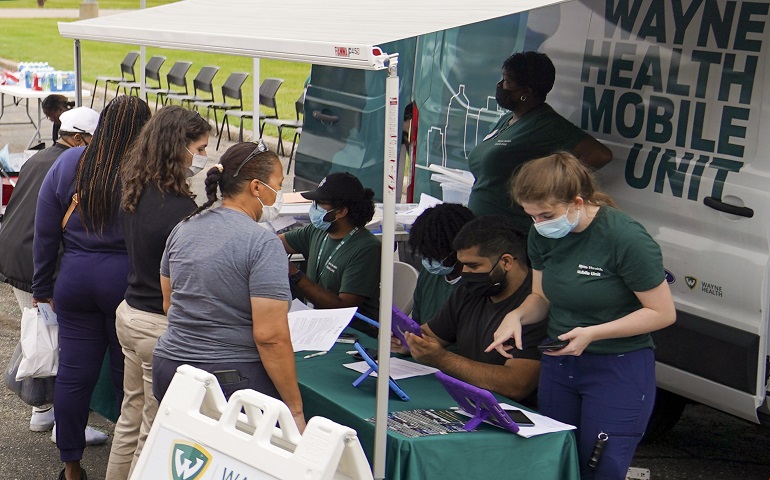The team used the U.S. Centers for Disease Control and Prevention framework for public health program evaluation. Their main objective was to determine the success of processes that were implemented to improve health equity by increasing access to difficult-to-reach populations from areas with heightened social vulnerability. They examined whether the additional screening identified patients at elevated risk of poor health outcomes, and determined whether patients requested and received assistance with referral to social services.
The program began as a rapidly deployed drive-through SARS-CoV-2 testing clinic that was housed in temporary canopy tent shelters at two fixed locations; one in Detroit and the other in Dearborn, Mich., during the first wave of the pandemic. As the local health department established its own large-scale drive-through testing site, the team pivoted toward a focus on patients from socially vulnerable areas who might lack transportation or otherwise be unable to access such services. From April 2020 to March 2021, they evolved and expanded into offering other services, such as lipid testing and blood pressure measurement.
“We were also able to help connect people to services like food resources and other health resources. Additionally, a large focus was on data collection, both of COVID cases and of the other data we began collecting,” said Dr. McGlynn, the study’s corresponding author.
The data was mapped across Detroit to show hot spots or areas of concentrated cases with a goal of also tracking other health measures like blood pressure.
“Eventually, when vaccines became available, we were able to use the mobile health units to administer vaccines in communities throughout the Detroit area,” Dr. McGlynn said. “The work is important in addressing the gaps in accessing health care created by the COVID pandemic as well as the pre-existing disparities throughout metropolitan Detroit. Not only do we aim to connect people to necessary health resources during this pandemic, but we also hope to build a foundation for further work like this in Detroit by collecting and mapping health data.”
The Detroit mobile health units program reached 32,523 people from March 20, 2020, through March 24, 2021. The proportion of patients who resided in communities with top quartile Centers for Disease Control and Prevention Social Vulnerability Index rankings increased from 25% during location-based “drive-through” SARS-CoV-2 testing from the first day of deployment to April 13, 2020, to 27% after pivoting to a mobile platform through Aug. 31, 2020.
The adoption of a data-driven deployment strategy resulted in even better results – 41% of the patients who sought Wayne Health’s mobile services from Sept. 1, 2020, through March 24, 2021, lived in vulnerable communities. Since Oct. 1, 2021, 1,837 people received social service referrals and, as of March 14, 2021, 4,603 were administered at least one dose of COVID-19 vaccine.
The scientists concluded that the deployment in at-risk communities also created an opportunity to collect information on health and social service deficits that enabled them to address those very needs.
The program is funded by the Michigan Department of Health and Human Services through 2024, with additional support from philanthropy and fee-for-service activity.
